For the abuser, reactive abuse is the perfect plan to undermine and abuse their victims more. This post covers everything you should know about reactive abuse.
Imagine this. Someone is getting abused by their partner, be it physically, emotionally, mentally, or even, financially, and this goes on for a long time. And then something snaps in the person who is getting abused, and they retaliate against their abuser. The moment they do this, the abuser claims that the victim is being abusive towards THEM, and not the other way around.
They have completely flipped the table and reversed the situation and so now, the victim becomes the abuser, and the abuser becomes the victim. And that my folks, is reactive abuse, in a nutshell.
Shocking, enraging and so unfair, isn’t it? Makes your blood boil, right? But unfortunately, this is what happens to so many people out there, who are still in the clutches of their abusers and are tormented by their abusive actions.
Signs Of Reactive Abuse
If you suspect that you are being subjected to reactive abuse, then you need to look out for these reactive abuse symptoms:
- Shifting the blame on you
- Deliberately trying to confuse you
- Gaslighting
- Emotionally tormenting you and pushing you till your snap
- Refusing to acknowledge their faults and instead always focusing on yours
- Launching a smear campaign against you
- Emotional, psychological, and mental abuse
- Using your sensitivity against you
What Is Reactive Abuse?
Reactive abuse is a major part of the manipulation, and psychological abuse by the abuser, when they claim that their victim is being abusive towards them, whenever the latter tries to protect themselves and take a stand against them. For the abuser, this is the perfect plan to undermine and abuse their victims more.
When you are constantly abused by someone, there’s only so much you can endure and go through. In the past, you might have tried to tell them how much they were hurting you, and how their toxic actions were gradually taking a toll on your mental health, but all they do is dismiss you off by calling you over-sensitive and weak. Well, reactive abuse and gaslighting do go hand in hand.
Listening to this over and over again breaks you down more and after a point, you find yourself scared and brainwashed to even acknowledge that what’s happening to you is horrible.
Related: 8 Signs Of Verbal Abuse And Health Problems Caused By It
You go through this day in and day out, and then finally, one day you snap and let go. You scream. You shout. You insult them back. You even give them a punch back, if they are being physically abusive towards you. You finally take a stand for yourself and hold them accountable for all their toxic mind games and vicious actions.
Now before you think that you have finally changed the power dynamics and have taken control of the situation, your abuser takes advantage of your reaction, and claim themselves to be the poor, hapless victim of your “abuse”.
They use the situation and your emotions as “proof” that you are crazy and unstable, and that they were the victims of your abuse for all this time, not you. They hold all of this against you and go on to brainwash you more about how you are abusive towards them.
You are still reeling from everything that is happening, and before you can stop yourself, you find yourself trying to talk to them about what went wrong, and try to make things right. But the abuser knows exactly how to play you, and by this point, they are having a lot of fun emotionally tormenting you. They don’t care about making things right, nor do they care about the reasons behind your outburst.
Reactive abuse makes them hold the “proof” in front of you, and with the help of it, they keep on tormenting you, just because you found the courage to stand up to their abuse.
They keep on saying things like “you don’t understand me at all!”, “you only care about your own feelings. What about my feelings?”, “I will have to walk on eggshells around you from now on”, “you are like a ticking time bomb”, and the best yet, “I didn’t scare you. YOU scared ME!”.
While they do all this, you start questioning yourself, whether they are indeed right, and you are wrong. Whether you are the problem, not them. Whether it’s you who has got it all wrong and you were just misunderstanding them and their intentions.
You fail to realize that your abuser is really the ticking time bomb, not you. You are the one who has to walk on eggshells, not them. You are so deep in the throes of their reactive abuse, that you start to hold yourself responsible for all the things that are going wrong.
And just like that, your abuser has reversed the roles and has painted you as the “abuser”, and themselves as the “abused”.
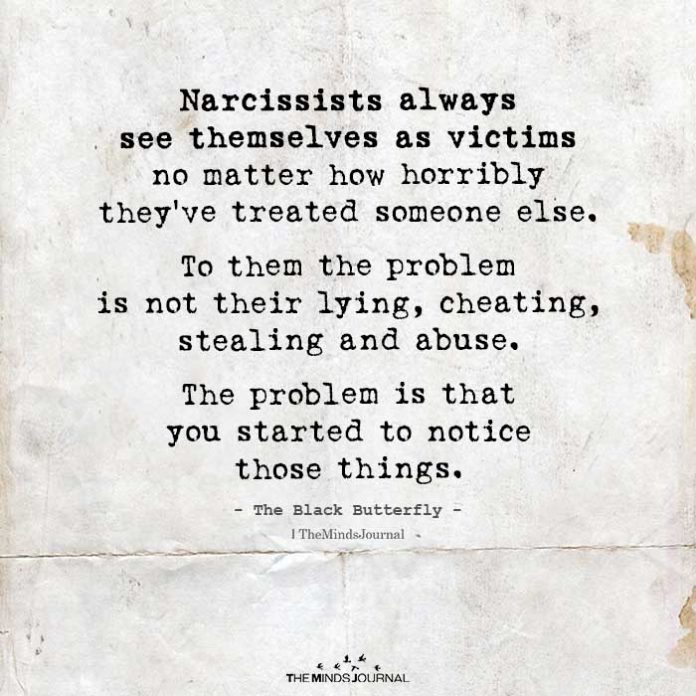
You start believing that you are actually emotionally unstable, toxic, and violent, you beat yourself up over it, and torment yourself further by thinking that you are a horrible person. You might even seek help to deal with how you “abused” your partner.
On the other hand, if you try to break all ties with your abuser, they will launch a smear campaign against you, and even get their flying monkeys to make matters worse for you, in front of other people. They stoop down to this level, because deep down inside they know that you have finally seen their truth, and the only way to keep you “in check” is by manipulating other people and their opinions about you.
The reactive abuse can sometimes be unfair to the victim, because it never does any kind of harm to the abuser, as such. Rather, it gives them an excuse to hold their victims responsible for something they did not do; it gives them more power over their victims, along with a humongous amount of self-righteousness.
Related: Projection: The Lethal Weapon Narcissists Use To Manipulate Others
Examples Of Reactive Abuse
Example #1
Brian and Eve are in a relationship for the past year. Brian suspects that Eve manipulates him whenever they get into an argument, and then very cunningly puts the entire blame on him. Even if chooses to stay quiet so that the situation doesn’t escalate, she constantly pushes him and goads him into fighting with her.
Then finally, when he explodes and screams at her and insults her, she behaves like a victim. She puts the whole blame on him by saying that he is the one who screamed at her and insulted her. At this point, since Brian has completely lost his temper, he finds it hard to come back from his anger and calm down.
And all this while, Eve keeps on blaming him for everything – how he always ‘mistreats’ her, how he is always losing his temper with her, how ‘cruel’ he is to her, and how he is always yelling at her.
Example #2
Jack and Ursula are attending a party thrown by one of their close friends. Both of them are mingling with their friends and having a good time with everyone. Now Jack has had a few drinks in his system and he is clearly quite drunk.
He is sitting with Ursula and all their friends chatting when suddenly he starts to make fun of Ursula. Initially, it starts off with a bit of leg-pulling and harmless jokes, but everyone can sense that the jokes are increasingly getting personal, insensitive, and hurtful. Ursula is feeling embarrassed and humiliated and she requests Brian to stop, but he doesn’t.
So she bears it with a stiff smile on her face and thinks about when they will leave. Once they reach home, she confronts him and asks him why he had to ridicule and humiliate her in front of all her friends. He keeps on ignoring her and when he ultimately cannot, he gets into her face and shouts at her.
He accuses her of being oversensitive, a pain in the a**, uptight and problematic. He says that if she cannot take a joke, she is the problem, not him. He keeps on degrading her and when she has had enough, she screams at him to stop.
The moment she does this, he pins the whole blame on her about how she is unnecessarily she is fighting with him and making a mountain out of a molehill. He refuses to acknowledge that he is the one who started the whole thing, and is now blaming her for reacting in a way, anybody would have reacted.
How Would You Know Who Is The Real Abuser, And Who Is The Victim?
Reactive abuse can sometimes be a hard terrain to navigate, but one of the best ways to know the truth is by studying both the victim and abuser properly. Noticing and understanding their attitudes and behaviors towards their own actions can say everything about who is actually the abuser, and who the victim is.
Victims will never shy away from admitting their faults if any. If they make any mistakes, they will always know what they did, and will try to make things right; they are good people with pure hearts who never want to hurt anyone intentionally. Unfortunately, this is that one quality their abusers always use against them to play their vicious games.
The only way to heal is by acknowledging the toxic actions of the abuser, and at the same time, understanding what you did wrong, and working towards making it right.
On the other hand, abusers will never own up to their mistakes and will keep on pretending that they did nothing wrong at all. It’s the victims who should be held accountable for everything that went wrong. They will nitpick, and blame them for every little thing, even the ones which were out of their control. Not just this, they will mock their background, ethnicity, mental illness, family, and personality, and use social bigotries against them.
Abusers will stoop down to any level to protect themselves and their malicious interests, and will never admit what they made their victims go through.
How To Stop Reactive Abuse
These are a few steps you can take in order to deal with reactive abuse and put a stop to it:
- Understand and acknowledge that you are not the problem here and that you’re being abused.
- Don’t take their abuse lying down, and take a stand for yourself.
- If needed, walk away from the toxic situation in order to maintain your sanity and dignity.
- If possible, try to look for positive ways of interacting with your abuser.
- Rely on your friends and family for emotional support, and talk to them about what’s going on and how you are feeling.
- Opt for therapy.
- Practice self-compassion and self-acceptance.
- Know that whatever you are going through, it’s not your fault. So don’t hold yourself responsible for it.
- Stop undermining your feelings and accept that the way you feel is completely natural.
- Use humor to defuse toxic situations and also distract yourself.
- Be more confident and assertive while dealing with situations like this, so that your abuser knows that they can’t mess with you.
Takeaway
When you are being abused, it is very natural to want to fight back against your abuser, and to put a stop to all the horrible things they do to you. However, try to be careful as to how you are fighting back against them.
If you give them a dose of their own medicine, they will exploit it and make you out to be the abuser, instead of them. They may try to gaslight and manipulate you into believing their version of what happened, instead of what REALLY happened.
Related: How To Shut Down Narcissist Manipulation For Good
Reactive abuse can be handled correctly and even prevented if you know how to react to your abuser’s actions; it might be tough, but it will help you protect yourself in the long run.
So think consciously about your responses to the situation in front of you, and then act accordingly. Know who you are, and what you stand for, and never let them drag you down to their level.
And most importantly, never believe all the horrible things they say to you and about you. Cultivate self-love and self-compassion in yourself, because those are the only things that can heal you from the trauma of abuse.
The next time you think about how to heal from reactive abuse, come back here; hopefully, this article will be able to help you even a little bit.
Frequently Asked Questions (FAQs)
Is reactive abuse still an abuse?
When you are constantly being abused, it’s normal to react and snap after a point. That is a very normal reaction, and cannot really be defined as abuse.
What kind of abuse may lead to reactive abuse?
Some of the most common causes of reactive abuse are gaslighting, emotional abuse, mental abuse, psychological abuse, physical abuse, smear campaigns, blame-shifting and manipulation.
What is the difference between reactive abuse and mutual abuse?
Mutual abuse is when both partners abuse each other in a bid to control and dominate the other into doing what they want. Reactive abuse occurs when a victim after being repeatedly abused, snaps and strikes back at their abuser in a bid to stop the abuse.
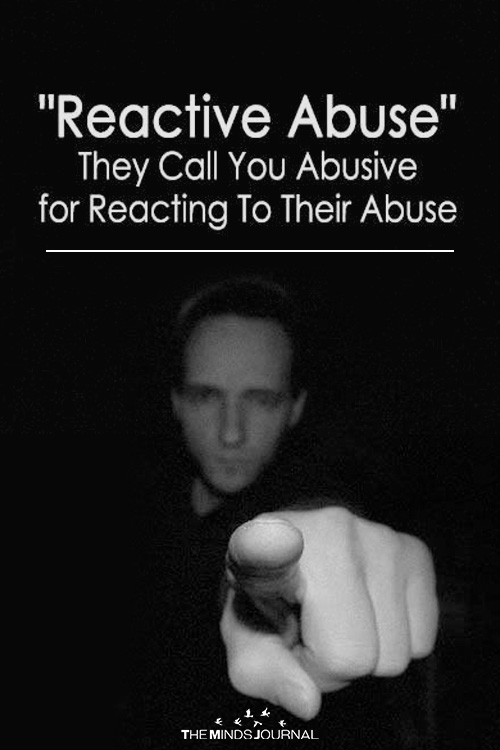
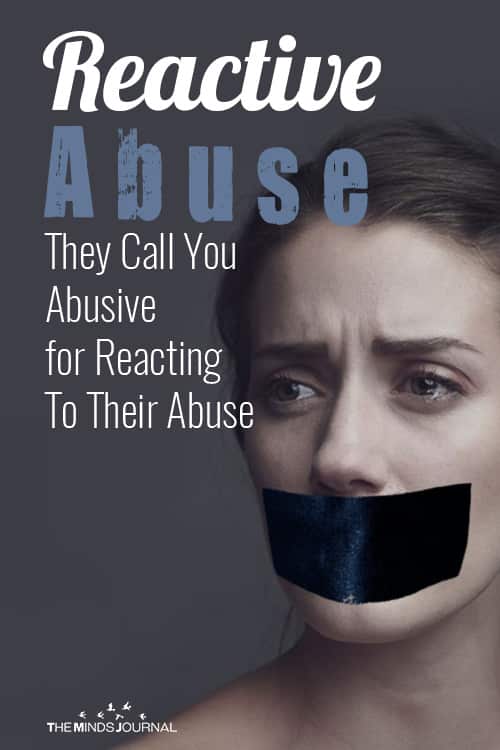
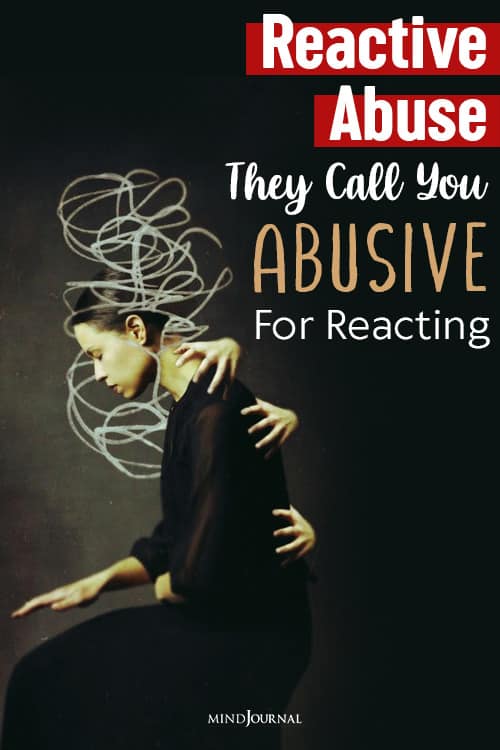
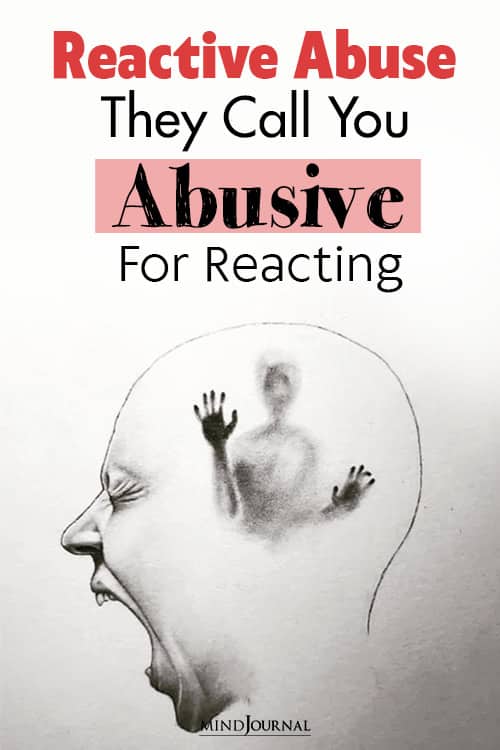
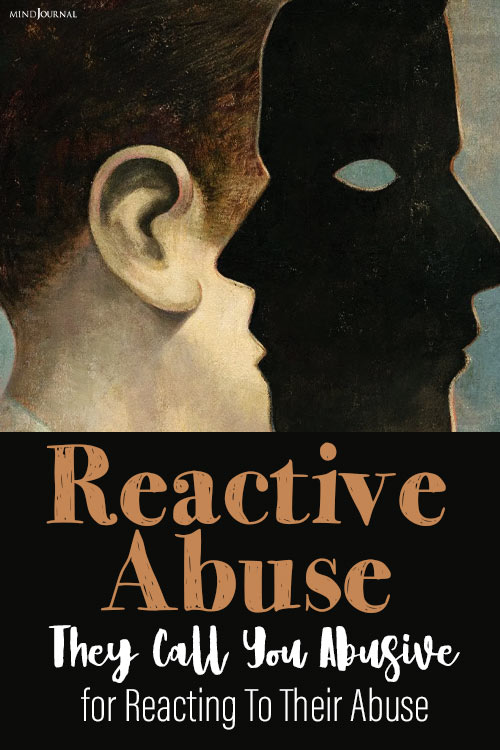
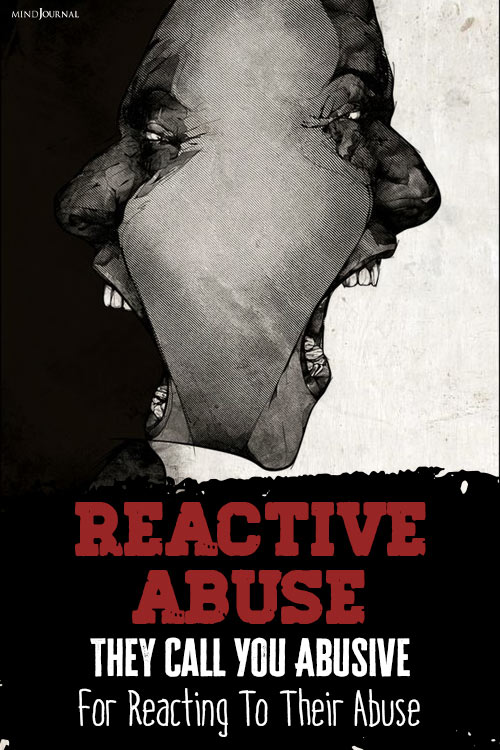
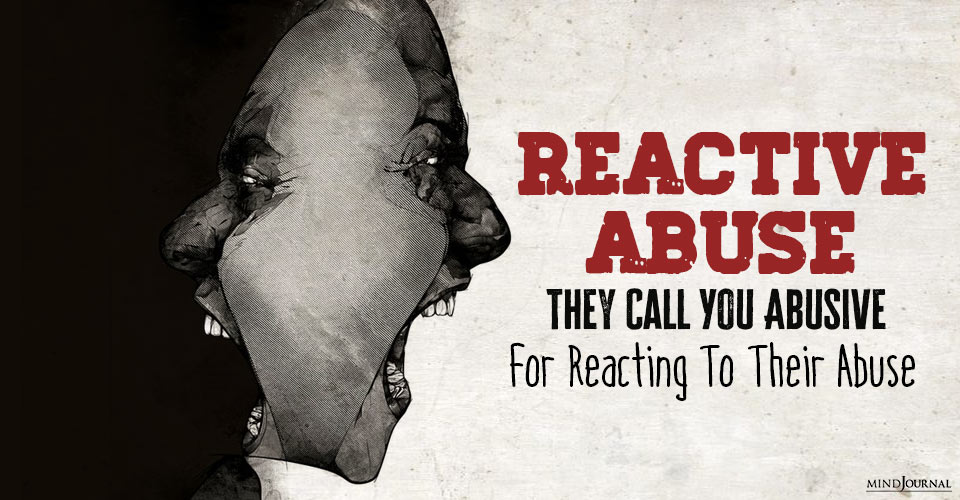
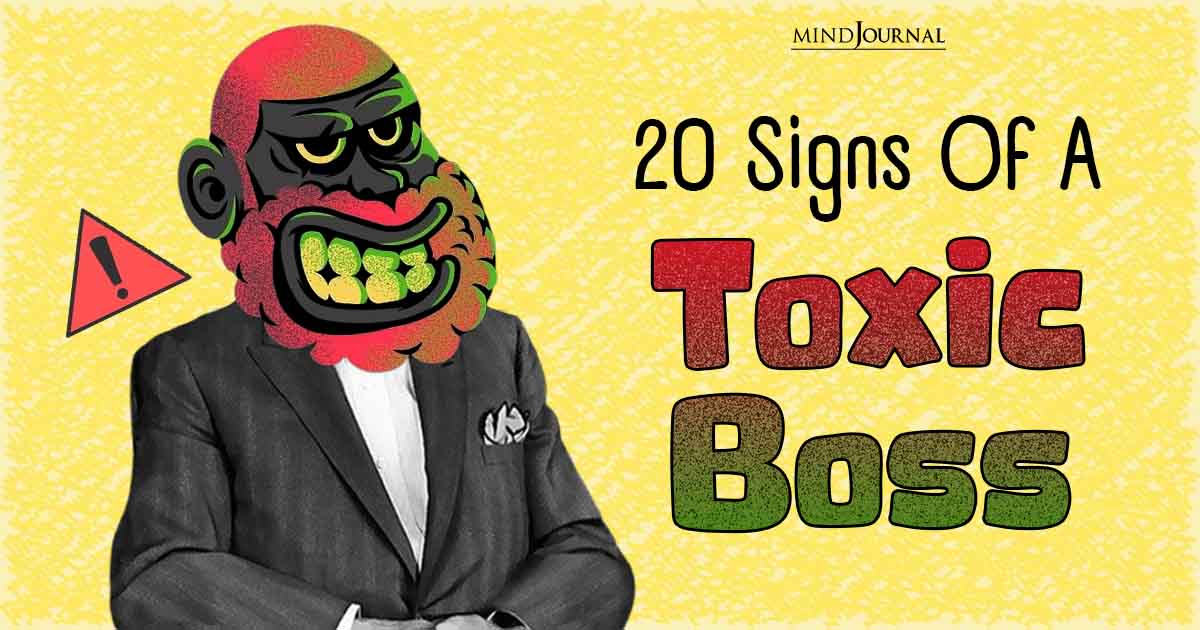
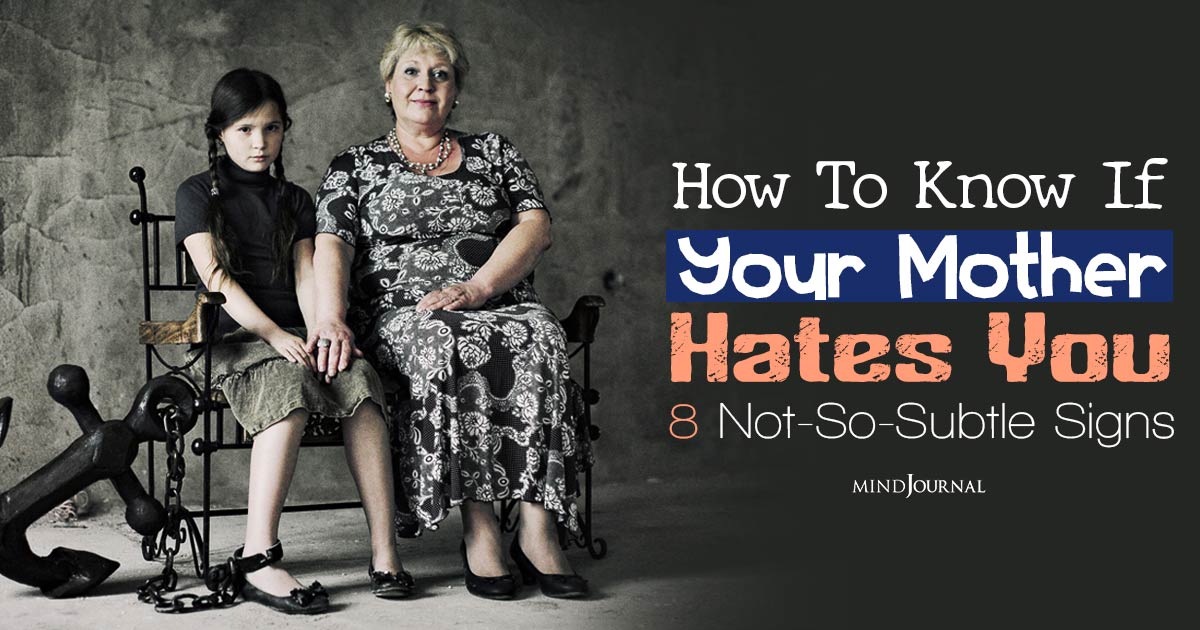





Leave a Reply
You must be logged in to post a comment.